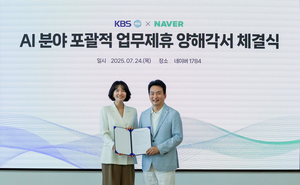As major networks sue Naver over unauthorized AI training data, KBS’ new collaboration with the tech giant highlights a fractured industry response
 Korean Broadcasting System headquarters in Yeouido (Newsis)
Korean Broadcasting System headquarters in Yeouido (Newsis) A recent decision by South Korea’s public broadcaster KBS and tech powerhouse Naver to collaborate on artificial intelligence is drawing scrutiny as the media industry grapples with mounting copyright disputes over AI training data.
According to the memorandum of understanding signed by the two companies in a ceremony on July 24, Naver will supply its AI technology solutions to the broadcaster, while KBS provides content and educational resources aimed at exploring next-generation media workflows powered by generative AI.
A major component of the deal involves KBS tapping into Naver’s video analysis tool, MAIU (Media AI Understanding), to mine archival programming — including KBS’ long-running titles such as “Screening Humanity.” The extracted content will then be reimagined into new formats using HyperClova X, Naver’s in-house generative AI model. KBS officials say they are weighing the application of this tech across broader swaths of the network’s library, including potentially generating AI-assisted documentary dramas focused on modern Korean history.
The two companies will also form a dedicated working group to map out ways to weave AI into the entire content pipeline — from planning and production to broadcast and distribution. Future collaborations may include developing disaster response tools that blend KBS’ content with Naver’s AI, along with AI-generated subtitles and descriptive audio tracks to expand accessibility for audience members who are visually impaired, and deaf and hard of hearing.
The timing of this pact has sparked concern within Korea’s broadcasting industry.
In January, KBS joined fellow terrestrial broadcasters MBC and SBS in filing lawsuits against Naver, alleging violations of copyright and the Unfair Competition Prevention Act.
The suit accused Naver of scraping and using broadcast news footage without consent to train its AI models, demanding financial compensation and a ban to stop further use. At the time, the Korea Broadcasters Association, led by the legal and intellectual property teams of the three broadcasters, framed the suit as a critical step in setting legal and ethical boundaries for AI’s use in journalism.
Now, with KBS publicly partnering with Naver just months later, industry insiders say the move may fracture the united front that Korea’s major networks had formed to push back against unlicensed data use by AI firms.
“This could be seen as Naver attempting to peel off individual broadcasters to weaken the broader legal effort,” said an official from a broadcaster who requested anonymity.
 Naver CEO Choi Soo-yeon (left) and KBS President Park Jang-beom pose for a photo during a memorandum of understanding signing ceremony held in Seongnam, Gyeonggi Province, July 24. (KBS, Naver)
Naver CEO Choi Soo-yeon (left) and KBS President Park Jang-beom pose for a photo during a memorandum of understanding signing ceremony held in Seongnam, Gyeonggi Province, July 24. (KBS, Naver) Industry experts say that while the lawsuit may appear at first glance to be a bid to block unauthorized use of news content for AI training, the core issue runs deeper. According to experts referencing the recent Naver-KBS partnership, broadcasters aren’t necessarily opposed to AI itself.
“I think the broadcasters’ core concern centers on the potential decline in news traffic, fearing that AI could infringe upon and disrupt their established business model once AI systems are trained on their content,” Lee Sung-min, an associate professor in the department of media arts and sciences at Korea National Open University, told The Korea Herald on Thursday. Lee also took part in the AI-Era News Copyright Forum held in 2024, where major broadcasters gathered to address the issue at hand.
“That, in their view, constitutes unfair competition, which likely explains why the lawsuits cite both copyright infringement and unfair business practices,” said Lee.
According to Lee, AI development is increasingly leaning toward models that rely on real-time web search — a process that will inevitably pull from broadcasters’ news output.
“Given that, the position of news copyright holders has fundamentally been that there needs to be a more legitimate framework for how their content is used (rather than opposing AI altogether). I believe the lawsuit is one of the strategies to bring these issues to the negotiating table with Naver,” he said, adding broadcasters may propose AI news usage fees as a potential compromise between tech companies and media outlets.
Meanwhile, other networks have signaled a willingness to engage in AI partnerships.
“SBS has also (individually) tried to strike a deal with Naver, but it fell through,” said a source from one of the three major networks.
“While individual agreements may not offer the same advantages as a unified deal, each broadcaster may view them as a pragmatic path toward a workable solution,” said Lee. He added that in light of the Naver-KBS partnership, the likelihood of a collective resolution has diminished, casting further uncertainty over the lawsuit’s prospects.
yoonseo.3348@heraldcorp.com
